This class is a simulation of a beam of trajectories class for Stoch Microm package. More...
#include <SM_Beam.h>
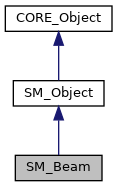
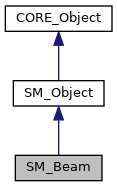
Public Member Functions | |
| virtual tMemSize | getMemorySize () const |
| return the memory size of the class and the memory size of all its attributes/associations More... | |
| virtual tMemSize | getContentsMemorySize () const |
| return the memory size of the included associations More... | |
| void | setIsTemplatedSimulateVersion (const tBoolean &v) |
| set true if the templated simulate method is called More... | |
| void | setBeamSize (const tIndex &n) |
| set the beam size More... | |
| const tIndex & | getBeamSize () const |
| get the beam size More... | |
| void | setStochasticFunction (CORE_UniquePointer< SM_StochasticFunction > &f) |
| set the stochastic function More... | |
| const SM_StochasticFunction & | getStochasticFunction () const |
| get the stochastic function More... | |
| void | setSystem (CORE_UniquePointer< SM_System > &sys) |
| set the system More... | |
| virtual const SM_System & | getSystem () const |
| return the system for reading More... | |
| virtual SM_System & | getSystem () |
| return the system for writing More... | |
| const std::valarray< tReal > & | getMagneticMoment () const |
| return the mu array More... | |
| std::valarray< tReal > & | getMagneticMoment () |
| return the mu array More... | |
| const std::valarray< tReal > & | getEnergies () const |
| return the Energy array More... | |
| std::valarray< tReal > & | getEnergies () |
| return the energies array More... | |
| void | discretize () |
| discretize the system More... | |
| const std::valarray< tReal > & | getDeterministicEnergies () const |
| return the deterministic energies More... | |
| tIndex | runSimulations () |
| run the simulations More... | |
| virtual tString | toString () const override |
| turn the class into a string representation More... | |
| void | computeL2Convergence (std::valarray< tReal > &L2conv) const |
| compute the L2 convergence for mu More... | |
| template<class T > | |
| std::shared_ptr< T > | getSharedPointer () |
| return the shared pointer for this More... | |
| template<class T > | |
| std::shared_ptr< const T > | getConstSharedPointer () const |
| return a const shared pointer for this More... | |
| template<class T > | |
| tBoolean | isInstanceOf () const |
| test if the clas T is an instance of this class More... | |
| tString | getClassName () const |
| return the name of the class More... | |
| tString | getPointerString () const |
| retrun the pointer of the class as a string More... | |
| tString | getIdentityString () const |
| retrun the string identification of the class More... | |
Static Public Member Functions | |
| static CORE_UniquePointer< SM_Beam > | New () |
| build a new instance of a SM_Beam More... | |
| static tBoolean | EnableMemoryStack (const tBoolean &isMemoryChecked) |
| enable the memory stack More... | |
| static void | EnableMemoryStack () |
| enable the memory stack More... | |
| static void | DisableMemoryStack () |
| disable the memory stack More... | |
| static tBoolean | IsMemoryStackEnabled () |
| return trur if the memory stack is enabled More... | |
| static tString | MemoryStackToString () |
| get the memory stack in string More... | |
| static tIndex | GetRegisteredClassesNumber () |
| get the memory stack in string More... | |
Protected Member Functions | |
| SM_Beam (void) | |
| create More... | |
| virtual | ~SM_Beam (void) |
| destroy More... | |
Private Member Functions | |
| tIndex | simulate () |
| simulate a beam by computing mu field by calling only virtual methods More... | |
| tIndex | templatedSimulate () |
| simulate a beam by computing mu field by calling only templated methods More... | |
| template<class SystemImpl , class NoiseImpl > | |
| tIndex | templatedSimulate (SystemImpl &system, const NoiseImpl &noise) |
| simulate a beam by computing mu field by calling only templated methods More... | |
| template<class T > | |
| std::shared_ptr< T > | setThis (std::unique_ptr< T, CORE_Object::Delete > &up) |
| set the shared pointer from an unique pointer More... | |
Private Attributes | |
| tIndex | mBeamSize |
| std::valarray< tReal > | mMu |
| std::valarray< tReal > | mEs |
| tBoolean | mIsTemplatedSimulateVersion |
| CORE_UniquePointer< SM_StochasticFunction > | mStochasticFunction |
| CORE_UniquePointer< SM_System > | mSystem |
| CORE_UniquePointer< SM_System > | mDeterministicSystem |
| std::valarray< tReal > | mDMu |
| std::valarray< tReal > | mDEs |
| std::weak_ptr< CORE_Object > | mThis |
Detailed Description
This class is a simulation of a beam of trajectories class for Stoch Microm package.
The simulation of a beam follows the algorithm:
image html beamAlgorithm.png
- Version
- 2.0
Constructor & Destructor Documentation
◆ SM_Beam()
|
inlineprotected |
create
References mBeamSize, and mIsTemplatedSimulateVersion.
Referenced by New().

◆ ~SM_Beam()
|
inlineprotectedvirtual |
destroy
Member Function Documentation
◆ computeL2Convergence()
| void SM_Beam::computeL2Convergence | ( | std::valarray< tReal > & | L2conv | ) | const |
compute the L2 convergence for mu
- Parameters
-
[out] L2conv : the L2 convergence of size getTimeStepsNumber();
References SM_NoiseRateFunction::computeFunction(), getBeamSize(), SM_ZeemanOperator::getBext(), SM_Network::getDimension(), getMagneticMoment(), SM_TimeStepper::getMaximumTimeStepsNumber(), SM_System::getNetwork(), SM_System::getNoiseRateFunction(), SM_System::getOperator(), SM_Network::getParticlesNumber(), getSystem(), SM_TimeStepper::getTimeStep(), SM_System::getTimeStepper(), tIndex, tNaturalInteger, and tReal.
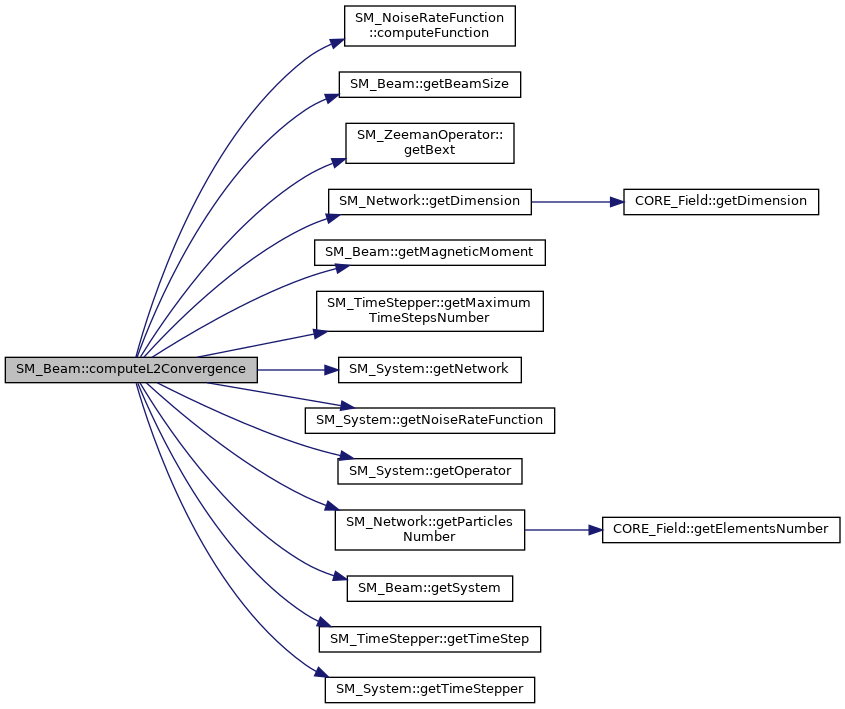
◆ DisableMemoryStack()
|
inlinestaticinherited |
disable the memory stack
Referenced by CORE_Object::EnableMemoryStack().

◆ discretize()
|
inline |
discretize the system
References SM_Network::getDimension(), SM_System::getInitialMagneticMoment(), SM_System::getLandauLifschitzFunction(), SM_TimeStepper::getMaximumTimeStepsNumber(), SM_System::getNetwork(), SM_System::getOperatorsNumber(), SM_Network::getParticlesNumber(), getSystem(), SM_System::getTimeStepper(), mBeamSize, mDEs, mDeterministicSystem, mDMu, mEs, mMu, mSystem, SM_ConstantNoiseRateFunction::New(), SM_ItoSystem::New(), CORE_Run::Out(), CORE_Out::printError(), tIndex, and tReal.
Referenced by SM_Test::grid3DParticlesTestCase(), SM_Test::linedParticlesTestCase(), and SM_Test::testEnergyOperatorsDerivatives().
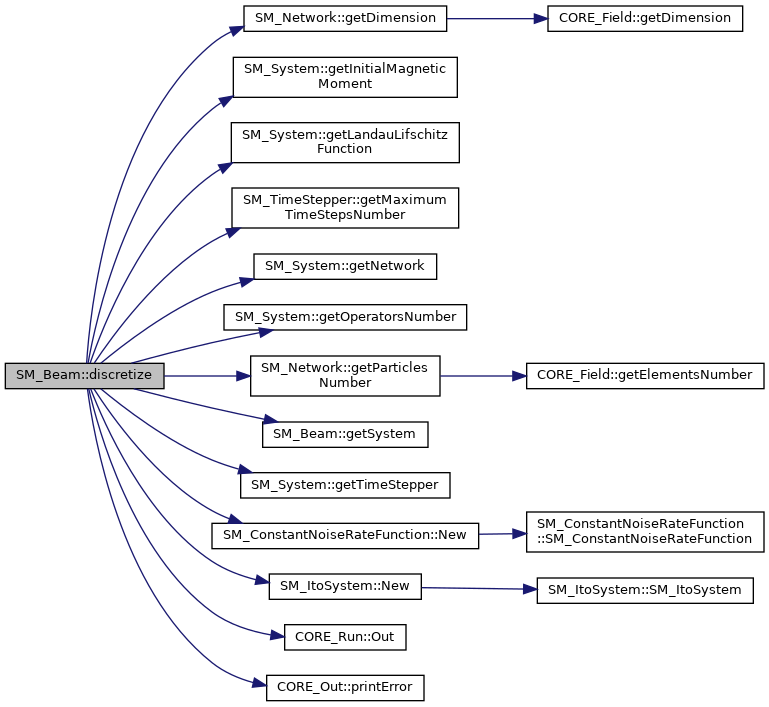

◆ EnableMemoryStack() [1/2]
|
inlinestaticinherited |
enable the memory stack
Referenced by CORE_Object::EnableMemoryStack(), and CORE_Run::SetDebugOptions().

◆ EnableMemoryStack() [2/2]
|
inlinestaticinherited |
enable the memory stack
- Parameters
-
[in] isMemoryChecked : true to verify memory allocation of CORE_Object classes
- Returns
- true if the memroy is checked
References CORE_Object::DisableMemoryStack(), CORE_Object::EnableMemoryStack(), and CORE_Object::IsMemoryStackEnabled().

◆ getBeamSize()
|
inline |
get the beam size
- Returns
- the number of trajectories to compute
References mBeamSize.
Referenced by computeL2Convergence(), SM_Output::generateOutput(), SM_Output::saveStochasticIndicators(), simulate(), and templatedSimulate().

◆ getClassName()
|
inlineinherited |
return the name of the class
- Returns
- the string name of the class
Referenced by CORE_Object::getIdentityString(), and CORE_Test::testTypes().

◆ getConstSharedPointer()
|
inlineinherited |
return a const shared pointer for this
- Returns
- the shared pointer as a type T
References CORE_Object::mThis.
◆ getContentsMemorySize()
|
inlinevirtual |
return the memory size of the included associations
- Returns
- the memory size of the storage in bytes 1 Kb = 1024 bytes 1 Mb = 1024 Kb 1 Gb = 1024 Mb 1 Tb = 1024 Gb 1 Hb = 1024 Tb
Reimplemented from CORE_Object.
References CORE_Object::getContentsMemorySize(), mDEs, mDeterministicSystem, mDMu, mEs, mMu, mStochasticFunction, mSystem, tMemSize, and tReal.
Referenced by getMemorySize().


◆ getDeterministicEnergies()
|
inline |
return the deterministic energies
- Returns
- the deterministic energies
References mDEs.
Referenced by SM_Output::saveStochasticIndicators().

◆ getEnergies() [1/2]
|
inline |
◆ getEnergies() [2/2]
|
inline |
return the Energy array
- Returns
- the Energy array for reading
References mEs.
Referenced by SM_Output::saveStochasticIndicators(), simulate(), and templatedSimulate().

◆ getIdentityString()
|
inlineinherited |
retrun the string identification of the class
- Returns
- the string identity of the class
References CORE_Object::getClassName(), and core_functions::pointerToString().
Referenced by CORE_Test::testArray(), CORE_Test::testField(), CORE_Test::testTypes(), CORE_Object::toString(), CORE_ClassFactory::toString(), and CORE_Field< T, K, D, S, I >::toString().


◆ getMagneticMoment() [1/2]
|
inline |
◆ getMagneticMoment() [2/2]
|
inline |
return the mu array
- Returns
- the mu array for reading
References mMu.
Referenced by computeL2Convergence(), SM_VTK::save(), simulate(), templatedSimulate(), and SM_Test::validate().

◆ getMemorySize()
|
inlinevirtual |
return the memory size of the class and the memory size of all its attributes/associations
- Returns
- the memory size of the class and the memory size of its attributes/associations in bytes The mamory size is :
- the added size of the base classes which contains:
- the primary attributes size depends on the order: (first delare the smallest attributes size
- all virtual functions costs <pointer-size> (4 32xor 8 64x) bytes by virtual function
- virtual inherihtance will increase of (4 or 8) bytes
- we add the size of the contains values of the attributes : for example the size of a string is the length of the string 1 octet = 1 byte 1 Ko = 1024 bytes 1 Mo = 1024 Ko 1 Go = 1024 Mo
- the added size of the base classes which contains:
Reimplemented from SM_Object.
References getContentsMemorySize().

◆ getPointerString()
|
inlineinherited |
retrun the pointer of the class as a string
- Returns
- the pointer of the calss as a string
References core_functions::pointerToString().

◆ GetRegisteredClassesNumber()
|
inlinestaticinherited |
get the memory stack in string
- Returns
- the string representation of the memory stack
◆ getSharedPointer()
|
inlineinherited |
return the shared pointer for this
- Returns
- the shared pointer as a type T
References CORE_Object::mThis.
◆ getStochasticFunction()
|
inline |
get the stochastic function
- Returns
- the stochastic function
References mStochasticFunction.
Referenced by simulate(), and templatedSimulate().

◆ getSystem() [1/2]
|
inlinevirtual |
◆ getSystem() [2/2]
|
inlinevirtual |
return the system for reading
- Returns
- the system for reading
References mSystem.
Referenced by computeL2Convergence(), discretize(), SM_Output::generateOutput(), SM_Test::grid3DParticlesTestCase(), SM_Test::linedParticlesTestCase(), SM_Run::loadBeamFromOptions(), SM_VTK::save(), SM_Output::saveStochasticIndicators(), templatedSimulate(), SM_Test::testEnergyOperatorsDerivatives(), SM_Test::testOperators(), and SM_Test::validate().
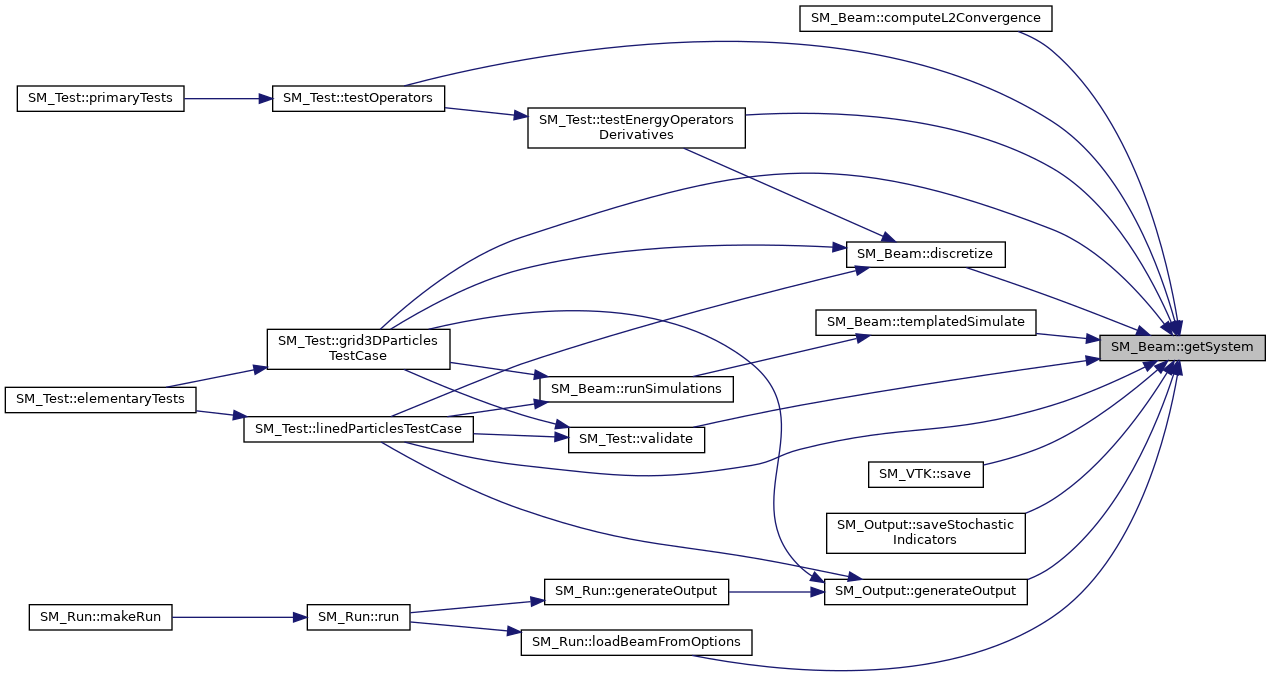
◆ isInstanceOf()
|
inlineinherited |
test if the clas T is an instance of this class
- Returns
- true if the object is an instance of T
Referenced by templatedSimulate().

◆ IsMemoryStackEnabled()
|
inlinestaticinherited |
return trur if the memory stack is enabled
Referenced by CORE_Object::EnableMemoryStack(), and main().

◆ MemoryStackToString()
|
inlinestaticinherited |
get the memory stack in string
- Returns
- the string representation of the memory stack
Referenced by main().

◆ New()
|
inlinestatic |
build a new instance of a SM_Beam
- Returns
- an unique pointer of SM_Beam
References SM_Beam().
Referenced by SM_ClassFactory::NewInstance().


◆ runSimulations()
|
inline |
run the simulations
- Returns
- the number of effective simulations without error
References mDEs, mDeterministicSystem, mDMu, mIsTemplatedSimulateVersion, simulate(), and templatedSimulate().
Referenced by SM_Test::grid3DParticlesTestCase(), and SM_Test::linedParticlesTestCase().


◆ setBeamSize()
|
inline |
set the beam size
- Parameters
-
[in] n number of trajectories to compute
References mBeamSize.
Referenced by SM_Test::grid3DParticlesTestCase(), SM_Test::linedParticlesTestCase(), SM_Run::loadBeamFromOptions(), and SM_Test::testOperators().

◆ setIsTemplatedSimulateVersion()
|
inline |
set true if the templated simulate method is called
- Parameters
-
[in] v true to call templated simulate method
References mIsTemplatedSimulateVersion.
Referenced by SM_Test::grid3DParticlesTestCase(), SM_Test::linedParticlesTestCase(), and SM_Run::loadBeamFromOptions().

◆ setStochasticFunction()
|
inline |
set the stochastic function
- Parameters
-
[in,out] f stochastic funtion. Points to nothing at end
References mStochasticFunction.
Referenced by SM_Test::grid3DParticlesTestCase(), SM_Test::linedParticlesTestCase(), SM_Run::loadBeamFromOptions(), and SM_Test::testOperators().

◆ setSystem()
|
inline |
set the system
- Parameters
-
[in,out] sys system to set
References mSystem.
Referenced by SM_Test::grid3DParticlesTestCase(), SM_Test::linedParticlesTestCase(), SM_Run::loadBeamFromOptions(), and SM_Test::testOperators().

◆ setThis()
|
inlineprivateinherited |
set the shared pointer from an unique pointer
- Parameters
-
[in,out] up unique pointer of the class at input, points to null pointer at output
- Returns
- the shared pointer of the class
Method only calledby the friend class CORE_ClassFactory::NewSharedInstance()
References CORE_Object::mThis.
◆ simulate()
|
private |
simulate a beam by computing mu field by calling only virtual methods
- Returns
- the number of effective simulations without error
References getBeamSize(), getEnergies(), getMagneticMoment(), getStochasticFunction(), mSystem, tIndex, and tReal.
Referenced by runSimulations(), and templatedSimulate().
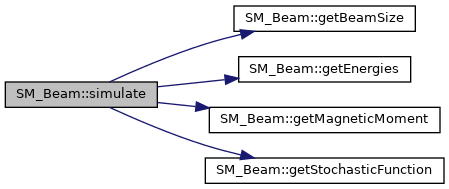

◆ templatedSimulate() [1/2]
|
inlineprivate |
simulate a beam by computing mu field by calling only templated methods
- Returns
- the number of effective simulations without error
References SM_System::getNoiseRateFunction(), getSystem(), CORE_Object::isInstanceOf(), and simulate().
Referenced by runSimulations().


◆ templatedSimulate() [2/2]
|
private |
simulate a beam by computing mu field by calling only templated methods
References getBeamSize(), getEnergies(), getMagneticMoment(), getStochasticFunction(), CORE_Object::isInstanceOf(), tIndex, and tReal.
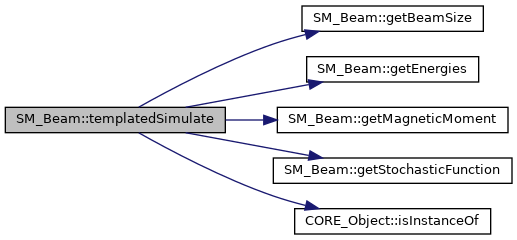
◆ toString()
|
inlineoverridevirtual |
turn the class into a string representation
- Returns
- a string representation of the class
Reimplemented from CORE_Object.
References mBeamSize, mStochasticFunction, mSystem, and CORE_Object::toString().

Member Data Documentation
◆ mBeamSize
|
private |
Referenced by discretize(), getBeamSize(), setBeamSize(), SM_Beam(), and toString().
◆ mDEs
|
private |
Referenced by discretize(), getContentsMemorySize(), getDeterministicEnergies(), and runSimulations().
◆ mDeterministicSystem
|
private |
Referenced by discretize(), getContentsMemorySize(), and runSimulations().
◆ mDMu
|
private |
Referenced by discretize(), getContentsMemorySize(), and runSimulations().
◆ mEs
|
private |
Referenced by discretize(), getContentsMemorySize(), and getEnergies().
◆ mIsTemplatedSimulateVersion
|
private |
Referenced by runSimulations(), setIsTemplatedSimulateVersion(), and SM_Beam().
◆ mMu
|
private |
Referenced by discretize(), getContentsMemorySize(), and getMagneticMoment().
◆ mStochasticFunction
|
private |
Referenced by getContentsMemorySize(), getStochasticFunction(), setStochasticFunction(), and toString().
◆ mSystem
|
private |
Referenced by discretize(), getContentsMemorySize(), getSystem(), setSystem(), simulate(), and toString().
◆ mThis
|
privateinherited |
Referenced by CORE_Object::getConstSharedPointer(), CORE_Object::getSharedPointer(), and CORE_Object::setThis().
The documentation for this class was generated from the following files: